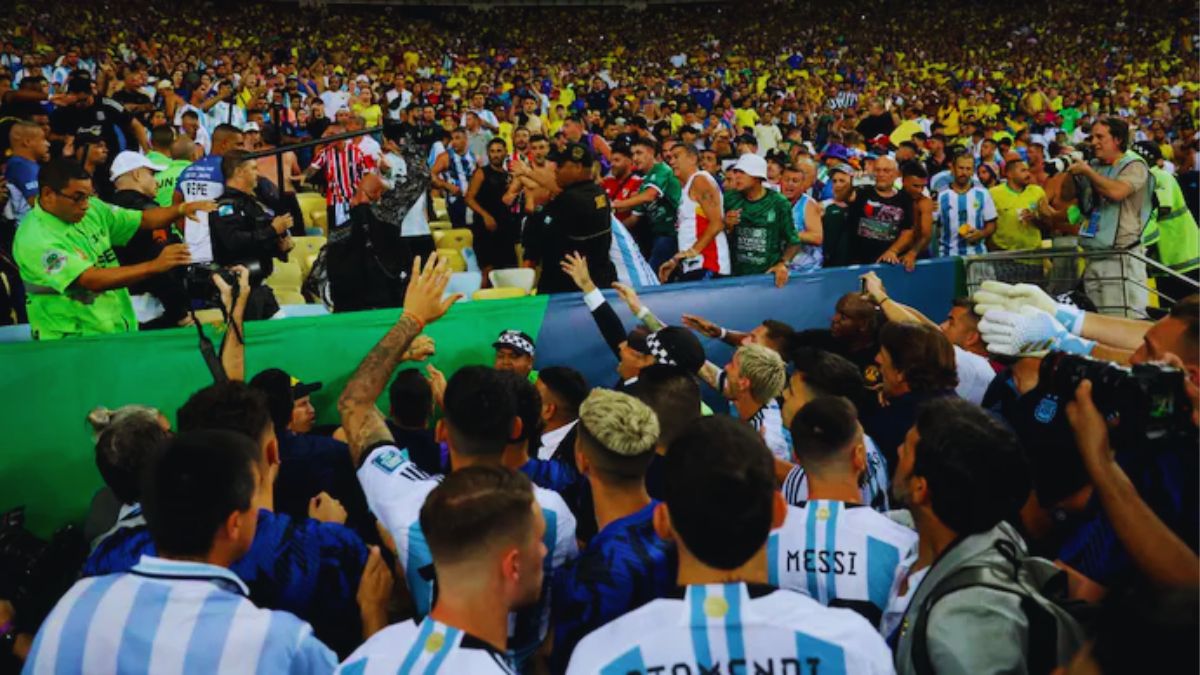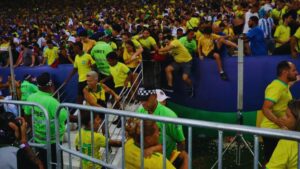In a shocking turn of events during the Brazil vs Argentina FIFA World Cup qualifier match on November 21, violence erupted at the Maracana Stadium in Rio de Janeiro, leading FIFA President Gianni Infantino to condemn the incidents that marred the game. The match, which witnessed Argentina securing a 1-0 victory, was overshadowed by clashes between Brazil police and traveling fans.
Also Read: Chaos at Maracana: Fan Clashes Delay Brazil vs Argentina World Cup Qualifier
The chaos ensued behind one of the goalposts as fans attempted to jump onto the pitch to escape police lathi-charging. The intensity of the clashes forced the match to come to a halt for half an hour, with players attempting to calm the situation before eventually retreating to their dressing rooms.
In response to the disturbing events, FIFA Chief Gianni Infantino released a statement on November 22, emphasizing the paramount importance of safety for all involved in football. Infantino urged the Brazil Football Confederation and relevant authorities to prioritize the safety of players, fans, staff, and managers at every level of the sport.
“Without exception, all players, fans, staff, and managers need to be safe and protected to play and enjoy football, and I urge the competent authorities to ensure this is respected at all levels,” stated Infantino.
The violence in Rio de Janeiro echoes recent clashes between fans of Argentina’s Boca Juniors and Brazil’s Fluminense earlier in November, highlighting a concerning trend of fan confrontations surrounding football events in the region.
Lionel Messi, the captain of the Argentine national team, took a stand against the brutality, accusing the Brazilian police of excessive force in dealing with the traveling fans. Messi, in a pitchside television interview, expressed his dismay at the way people were treated, drawing parallels with a similar incident during the Copa Libertadores final between Boca Juniors and Fluminense.
“It was bad because we saw how they were beating people … The police, as it already happened in the Libertadores final, were once again repressing the people with night sticks, there were players who had families over there,” Messi voiced his concern.
The chaos unfolded during the national anthems when Brazilian and Argentine fans engaged in a violent confrontation behind one of the goals. In response, the police charged at the traveling fans, leading to an escalation of the situation.
Reflecting on the incident, Lionel Messi emphasized the potential severity of the situation, stating, “We went to the locker room because it was the best way to calm everything down, it could have ended in tragedy.”
Despite the disturbing scenes, Argentina managed to secure a 1-0 victory with a 63rd-minute headed goal from defender Nicolas Otamendi. The team celebrated the triumph in front of their fans, attempting to shift the focus back to the sport amidst the turmoil that transpired earlier.
As football fans and authorities grapple with the aftermath of this shocking episode, questions arise about the broader implications for fan safety and security in football events, prompting a crucial examination of measures to prevent such incidents in the future.





